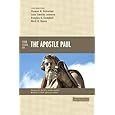 Perhaps one of the most hotly anticipated NT academic book releases of 2012 is the Zondervan Counterpoints volume Four Views on the Apostle Paul edited by Stan Gundry and Mike Bird. If you are not familiar with how this series works, a handful of specialists give their approach to a subject and the other contributors take turns responding. In this book, here are the four views
Perhaps one of the most hotly anticipated NT academic book releases of 2012 is the Zondervan Counterpoints volume Four Views on the Apostle Paul edited by Stan Gundry and Mike Bird. If you are not familiar with how this series works, a handful of specialists give their approach to a subject and the other contributors take turns responding. In this book, here are the four views
Thomas Schreiner (“A Reformed Reading”) – Conservative evangelical Pauline scholar Tom Schreiner offers a classic, penal-substitutionary perspective on Paul. Nothing shocking or surprising here. He capably condenses a traditional perspective.
Luke Timothy Johnson (“A Catholic Perspective”) – Johnson is one of my absolute favorite Biblical scholars. He is a generalist, not limited in expertise to Paul, but well-versed in all of the NT. He focuses especially on the phenomenological dimensions of Paul’s influences as well as his social context.
Douglas Campbell (“A ‘Post-New Perspective’ Account”) – Doug Campbell, known for his massive book Deliverance of God, is a brilliant Pauline scholar – innovative, interdisciplinary, and extremely well-versed in “Dogmatics” and philosophy. I would HATE to be in a debate with Campbell. I recall N.T. Wright saying about Campbell, “He could sell me a dead horse.” Right. As for his “viewpoint,” he has his own particular take on Paul that is highly influenced by strands of Barthian Reformed theology and also apocalyptic thought.
Mark Nanos (“A Jewish View”) – Nanos is a very welcome voice in Pauline Studies because he brings a uniquely Jewish perspective on a discipline that has had an unfortunate anti-semitic bias for too many years.
Strengths – this is a fun book. I practically read the whole book in one sitting because, thanks to the type of series, the reader gets excited about digging into both main chapters and responses. Mike Bird does a fantastic job taking stock, when the dust has settled, of who said what and how each contributor gave a unique perspective in his conclusion. It is like going to a conference without taking the airfare and hotel hit! I recommend seminary and PhD students interested in Pauline theology pick up this book. It is well worth the time!
Especially in the responses, one can see brilliant minds at work – analyzing, criticizing, and challenging. If you are a PhD student, you can learn a lot in these responses about how one breaks down an argument and tests each idea. It is scary to be on the receiving end, but in this case you can just watch it all take place! Some of the responses remind me of a horror movie – terrifying to watch, but you cannot turn away because you HAVE TO see what happens next!
Weaknesses – OK, having said that it is well worth reading, it did not quite meet my expectations. It is a great idea for a book, but somewhere in the planning it became idiosyncratic. The Counterpoints series, as I understand it, begins with “main views” and then tries to find experts that can represent that view. Here we have 4 excellent Pauline interpreters, but (aside from Schreiner and possibly Nanos) their views are rather personalized. That makes me wonder, who is this book for? It is not really something I would use for an introduction to Pauline theology. It belongs more with a senior seminar or ThM course on “modern interpretations of Paul.”
Secondly, I think the range for each contributor was too broad – Paul’s view of salvation, Christology, ecclesiology, and epistemology. Wow! Just one of those areas would be stretching the task, but all four? As you could imagine, each contributor ended up focusing on something more specific -thus, it was hard, at the end of it all, to compare views.
Finally, some of the contributors did not really follow the book plan, which also made the book a bit uneven (a point picked up by some respondents).
Conclusion
Pour a cup of coffee, kick back, and enjoy a Bird-brewed (but not bird-brained!) Pauline roundtable discussion. You will learn a lot along the way about just how differently one can approach the theology of Paul. While the book was not what I expected (e.g., it won’t really work for an intro course to Paul), it should not be ignored. All four of these scholars are “here to stay,” so to speak, in Pauline studies, so why not get a good grip on what they think about Paul and how they are different?
Also, we are working on getting a very worthy Pauline scholar to give a full-fledged review of this book in a soon-coming (probably 2013) issue of Journal for the Study of Paul and His Letters (and, no, Mike Bird doesn’t have any editing privileges when that review comes on!)











